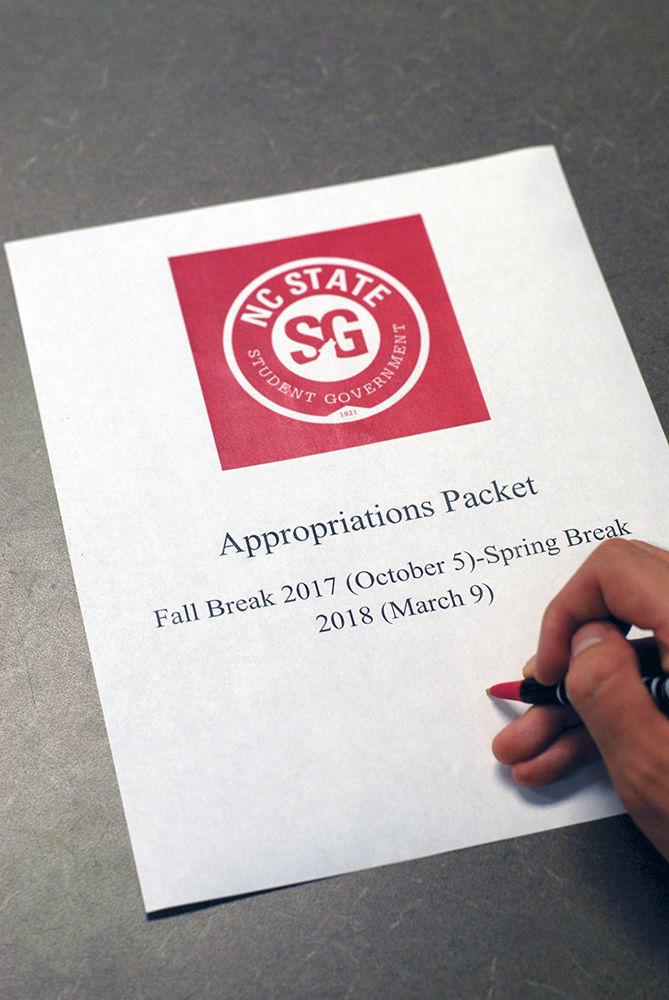 Photo Illustration of the Student Government appropriations packet." />
Photo Illustration of the Student Government appropriations packet." />
Photo Illustration by Glenn Wagstaff
Photo Illustration of the Student Government appropriations packet.
Twice a year, Student Government allocates one-third of their budget for funding clubs through the appropriations process. This process takes place in cycles from fall break to spring break and allows student organizations to receive extra monetary support.
This past weekend was a time for club leaders to meet with the appropriations committee for an interview for 5-10 minutes to explain the information in their application and how they’ll use that money.
Clubs can apply for either a startup fund or an expense request. Startup funds are granted for organizations that have newly registered within the past two semesters, and student organizations can request them once.
This cycle, clubs requesting startup funds were not required to do an interview.
“We want to encourage clubs to get off their feet,” said Molly Mueller, chair of the Senate Appropriations committee and a third-year studying political science. “It’s a lot less restrictive on what they can spend it on.”
After the committee has organized and verified everything correctly, two senators each review an application with rubric in hand.
“There are several factors we look at,” Mueller said, upon being asked on what a club would gain more points on. “One of the big ones is how it impacts the NC State community.”
After reviewing the applications, the same senators interview the organization with a point-based system similar to the one used for the application and average the two scores out.
The remaining score is then assigned to a percentage range depending on how the numbers scale out, meaning that a club will get that much of its requested amount. When all the percentages have been assigned, the committee reconvenes to confirm that no member has been scoring too high or low.
“We’re pretty consistent about our grading,” said Student Body Treasurer John Taylor Willis, a third-year studying business administration and international studies. “Most of the time an application and an interview receives roughly the same score.”
Other than preparing surplus money for the appropriations budget for each cycle, Willis is in charge of distributing the checks and collecting receipts.
Every cycle, clubs are required to return receipts proving they used their money for its designated use. Should they not manage to get these receipts in or misuse the money and not return it to Student Government, Willis files them onto the ineligibility list.
The ineligibility list indicates to student organizations whether or not they’re able to apply for money. If a club hadn’t sent in receipts from fall break ‘16 to spring break ‘17, they had an opportunity on Sept. 6 of that cycle. However, if they hadn’t returned receipts from up to five cycles before that, they wouldn’t be eligible to apply for appropriations.
Willis is currently under investigation by the Government Relations and Oversight committee for charges of neglect of duty related to missing self-imposed deadlines involving the ineligibility list.
Other than situations where a student organization is on the ineligibility list, Mueller did admit there were some cases where student organizations applied and didn’t receive any money at all.
“We’ve had organizations that had hundreds of thousands of dollars, so we just feel that money would be better spent on a different organization,” Mueller said. “The net impact of $500 could make a bigger difference for a smaller club. We want to make sure every club has the opportunity to expand and do what they need to do to make NC State a better place.”
This year, appropriations moved all of their resources online. The process itself was restructured as well.
“This was a little unnerving,” said Fri Momin, a member of the board of trustees or ‘Shura’ for the Muslim Student Association (MSA). “But, it was easier this year.”
According to her, appropriations benefits MSA a great deal. The student organization is very focused on bringing in speakers and cultural events, which means that they have to rely on funding for a plethora of things.
While their finance director primarily took care of the appropriations process, Momin explained that the Shura pitched in suggestions for what wasn’t done last year.
For them, the most important part of the appropriations process is wording their application correctly. Momin says that there has never been any dissatisfaction with the amount of money MSA received, but more so a case where the members thought things could have been worded better.
Should a student organization want to request more money, they are given the opportunity to attend a senate meeting and state their case. The details of how much every club receives through appropriations and what it is for is listed on a bill to be heard by the senate.
“I’m always happy to talk to organizations if they have any concerns or issues about the process.” Mueller said. “It’s a pretty transparent and open process.”